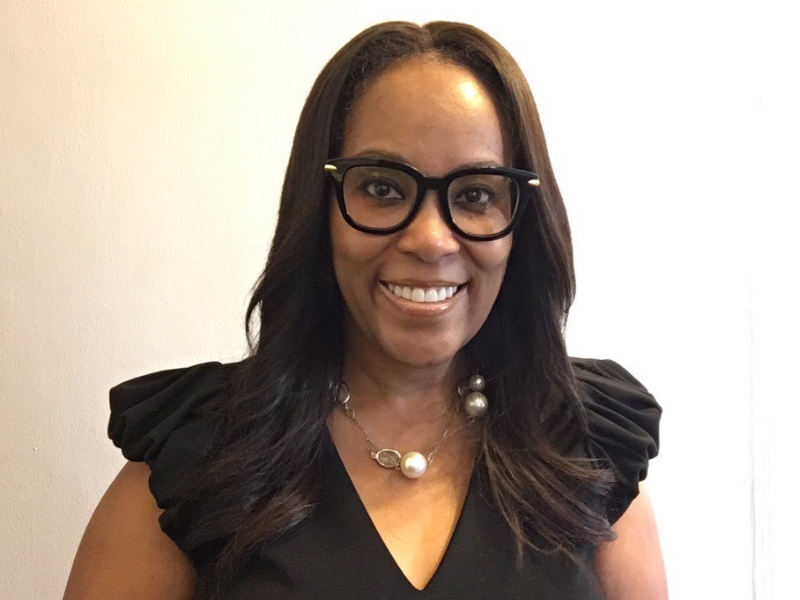From Cancer Alley to combatting breast cancer and health disparities

Growing up in southwest Louisiana near the corridor known as “Cancer Alley,” Dr. Janeen Azare (MSPH EHS ’94) was always curious about the way cancer affected populations differently. Now, she is a senior field medical director at Pfizer working to combat breast cancer and health disparities.
“That brings it full circle,” said Azare, a New York City resident. “Many, many years later, here I am working on something very similar.”
Her background in public health at the Tulane University School of Public Health and Tropical Medicine has played a formative role in her successful career. After receiving her Bachelor of Science degree in microbiology/chemistry from Xavier University, Azare earned her Master of Science in Public Health degree from Tulane.
“Tulane afforded me the opportunity to collaborate with my peers both locally and internationally,” said Azare. “My work in the lab there just made me feel as though I had the tools to solve all societal ills in my community.”
While at Tulane, Azare worked with Dr. LuAnn White, professor and senior associate dean, to study lead exposure in New Orleans children living in the Gert Town neighborhood. Azare conducted interviews with parents and tested surfaces for lead levels in the children’s homes. “This project was important because lead exposure is known to cause neurological disorders, and so, depending on the results that we found, we were able to offer solutions on how to lower the exposure for kids.”
On another public health project at Tulane, Azare tested waste remediation to make sure the remediation process was within acceptable guidelines. She offered solutions for better processing and different types of opportunities for reuse of the waste products, such as recycling.
“Both of these projects were very pivotal in what I’m doing now, as a senior field medical director in breast cancer, because they both provided me a background for education and awareness on looking at data and how to provide a fair-balanced approach in terms of how you use these data.”
After graduating from Tulane, Azare earned her PhD in environmental health sciences-toxicology from the New York University Medical Center Nelson Institute of Environmental Medicine and completed postdoctoral training at Memorial Sloan-Kettering Cancer Center where she was a research fellow in the Department of Medicine.
In her role now as senior field medical director for breast cancer at biopharmaceutical company Pfizer, she helps educate physicians, nurses, and pharmacists about Pfizer’s products and clinical trials, so “they can use that data to help their patients.”
She is also conducting important work as a charter member of Pfizer’s Diversity in Clinical Trials Center of Excellence. “Their mission is to help enroll a diverse patient population in clinical trials, meaning diverse in age, sex, race, and ethnicity. That’s just very important to make sure the products that we’re developing has the potential to be beneficial for more patients.” She has been at Pfizer for five years, and during her tenure, the Center of Excellence has grown to provide support in many areas, including trials on the COVID-19 vaccine and oncology drugs.
“That’s been really rewarding to work in that area,” she said.
Azare’s research has been published in peer-reviewed journals, and she has served on several scientific committees. She is a member of the American Association for Cancer Research, American Public Health Association, and the American Society of Clinical Oncology. In addition to her busy schedule and important work at Pfizer, Azare has served on the School of Public Health and Tropical Medicine Alumni Association Board of Directors since January 2018.
“I just think it’s so important to remain connected to Tulane,” said Azare. “I received a good education, and I think it’s just important to make space for others with a similar trajectory, especially for minority students from underrepresented communities that are interested in the sciences.”
Azare regularly interacts with other Tulane graduates in her career and in New York, and she said the network is impressive. “Tulane’s reputation is vast,” said Azare. “Having (a Tulane degree) lends automatic credibility in many settings.”
She reflected on her successful career, one that allows her to positively impact numerous lives. She advises current graduate students in public health to “stick with it” through “all-night study sessions and challenging exams” because their education will empower them to change the future of public health. “The world that was opened to me was well worth the grind.”
